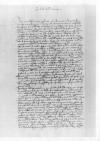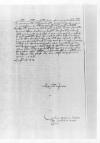Letter #6281
Cornelis DE SCHEPPER to [Ioannes DANTISCUS?]Prague, 1534-08-09
English register:
The original of this letter is not preserved. Only an excerpt, viz. the second part of the letter with the novitates, has been preserved in a contemporary copy in the 'Herzogliches Briefarchief' in the Königsberg archives, along with a German translation.
De Schepper gives a lengthy justification for the surrender to the Turks of the city of Corone, which had only recently been conquered by Andrea Doria for the Emperor [Charles V]. He himself had long been aware of this decision, but he had kept it secret so as not to endanger the Spanish garrison there. The fortress has an unsafe anchorage, exposing the ships of the defence to enemy attacks. Moreover, the Turkish fleet has grown so well equipped that even in the high seas it is a dangerous adversary. Meanwhile, wicked Christians proved at least as great a danger as the Turks, luring the French King [Francis I] into alliances against the Emperor, and provoking severe uprisings.
Due to its location, Corone is difficult to supply. Jeopardising the Spanish garrison there would have discouraged the troops in other enterprises of the Emperor. Finally, negotiations with the Sultan [Suleiman the Magnificent] were appropriate because of the difficulties in supplying and defending the numerous cities captured by the Emperor. To all these arguments to give up Corone may be added that for reasons undisclosed here, King Ferdinand insisted on rendering a service to the Sultan. He sent De Schepper to obtain this from the Emperor.
As a result the Spanish garrison and the Greek inhabitants were able to leave the city unharmed, taking with them all their possessions, equipment and supplies. The Spanish soldiers have safely arrived in Sicily. Upon these considerations everyone should acclaim the decision to surrender Corone.
The Emperor will soon be confronted with a major war with the Turks. After their unfortunate sea expeditions they have appointed the corsair Khair al-Din Pasha as chief commander of their navy. He is a major threat to all Christians, save for the French. On the imperial side the Mediterranean coasts are well defended, and a considerable navy is on stand-by.
In Germany all is peaceful now. The instigators of the unrest have wasted their effort. The Emperor desires to engage in a serious campaign against the enemies of the faith, but he is impeded by many internal difficulties.
Dantiscus should know that De Schepper will soon leave for Spain, and be aware that he is as always willing to render him a service.
Manuscript sources:
Prints:
| ||||||||
Text & apparatus & commentary Plain text Text & commentary Text & apparatus
 GStA, PK, HBA, H, K 763, p. 5 unnumbered
GStA, PK, HBA, H, K 763, p. 5 unnumbered
Ex litteris domini Cornelii etc.
Scio non defuturos apud vos, qui admirantur de quibusdam, qui hoc anno advenere interque alia de
Nunc taceo, quod certissimi fuimus de summo apparatu classis, quem faciebant
Quod ad alia attinet,  GStA, PK, HBA, H, K 763, p. 6 unnumbered
intentam in omnem occasionem. Brevi resciemus, quid attentaverint.
GStA, PK, HBA, H, K 763, p. 6 unnumbered
intentam in omnem occasionem. Brevi resciemus, quid attentaverint.
In
Ex
Eiusdem Dominationis Vestrae Reverendissimae ex animo inservitor

